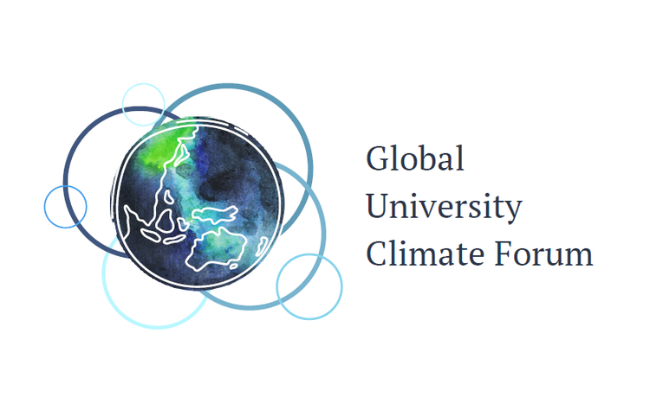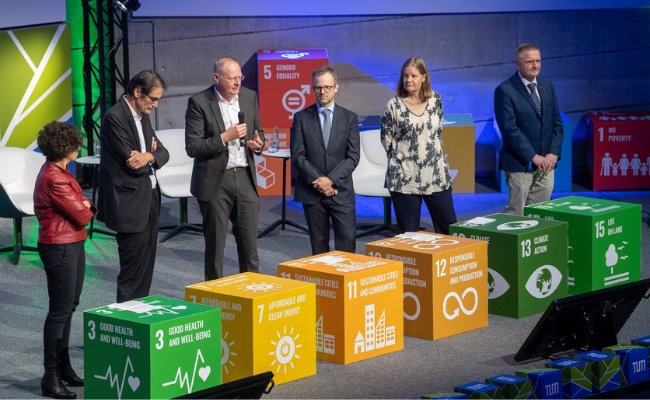Global University Climate Forum 2022 Showcase
Led by the Environmental Innovations Initiative at the University of Pennsylvania on behalf of the ISCN, the Global University Climate Forum offers university students from around the world the opportunity to define and lead their own local-scale projects in the context of the global climate negotiations.
This event (open to everyone) will feature a selection of videos from the 2022 cohort as well as a panel discussion of members of the newly appointed youth-led leadership committee. The Forum is currently accepting applications for the 2023 cohort: student applicants and advisors are encouraged to attend.
🗓️ 24 March ||⌚️ 12:00-1:00 pm EST (UTC-5) || Register now >>
Edinburgh Earth Fellows
The Edinburgh Earth Fellows Program, an initiative of The University of Edinburgh, brings together students from across the academic spectrum to work on a range of climate and sustainability projects created in collaboration with university-wide academics and partners. This semester, Postgraduate Earth Fellows Christelle Kwizera and Sophie Zych-Watson will be working with ISCN to support strategic planning in membership development, funding, and sponsorship. Through this collaborative effort, The University of Edinburgh and ISCN are demonstrating their commitment to driving positive change and fostering the next generation of sustainability leaders. Our thanks go to Dave Gorman for funding and Matthew Lawson for organising these positions.
Christelle Kwizera

What are you studying/what is your research?
I am currently a Master of Science student, studying Climate Change Finance and Investment. I am planning to do a dissertation on the current scale and credibility of carbon credits from water projects in Sub-Saharan Africa.
Why did you want to become an Edinburgh Earth Fellow?
When I applied to The University of Edinburgh, I was excited about what the University was doing with sustainability and climate change. On arrival to campus, I realized there were many more initiatives than I initially thought. I wanted to be part of the vibrant community making it happen and the Fellowship offered a way to do this while delivering an actual project that would be useful. As I am only here for one year, the fellowship is a great way to building great connections with others in the field.
What do you hope to do with your career in this field?
I hope to get better at channeling climate finance to initiatives that need it, especially in Less Developed Countries (LDCs) and in currently under-funded adaptation sectors, such as water.
Given your work to date with ISCN, what has stood out to you about the network?
I have been amazed at the scale of commitment that ISCN members have when it comes to building sustainable operations in all they do. I keep getting wowed by the different initiatives and projects I get to learn about. The ISCN membership has clear value-aligned members, and I think it will be a great partner to new universities wishing to scale up their sustainability efforts.

Sophie Zych-Watson
What are you studying/what is your research?
I am currently studying for a Master’s degree in Outdoor Environmental and Sustainable Education. My emerging research focus is on place-based learning for marine sustainability among coastal communities in Scotland. I am also developing technical skills and working towards qualifying as a Mountaineering Leader. Following my degree, I hope to contribute to Scotland’s emerging green sector and address environmental issues through meaningful education initiatives that brings the outdoors into the classroom.
Why did you want to become an Edinburgh Earth Fellow?
I became an Edinburgh Earth Fellow as I wanted to direct my career focus towards working more closely with climate change adaption and sustainability. Thus far, my career has been focussed in the charitable sector, funding outdoor therapy and development for vulnerable individuals. Through working with the ISCN and the Edinburgh Earth Initiative, I am able to combine my existing funding experience with my current research towards actively working towards a more sustainable future in educational settings.
Working with ISCN through the Edinburgh Earth Initiative has also enabled me to engage with a range of academics and professionals across multiple disciplines. This has given me so many opportunities for shared learning and shared best practice, which has massively enhanced my personal development.
What do you hope to do with your career in this field?
Ultimately, I hope to combine my various professional and academic strands together in a meaningful way to contribute to active climate change mitigation both in Scotland and internationally. I would love to set up my own business working towards sustainable marine practices on the west coast of Scotland, but in the meantime, I hope to continue to engage with organisations, such as ISCN, who are directly engaged in promoting sustainability.
Given your work to date with ISCN, what has stood out to you about the network?
My current studies have emphasised the importance of a social justice approach to environmentalism, and an attentiveness to the different privileges or disadvantages that are faced when moving towards Net Zero and a sustainable future. ISCN’s initiative to leverage the international collective knowledge of member universities with localised issues on the ground in Latin America through the ISCN Latin American Chapter (ISCN-LATAM) particularly stands out in this regard. For me, a commitment to understanding the complex social and environmental challenges that exist in different contexts is important and critical if we are to generate impact in universities around the world.
Technical University of Munich appoints VP Sustainable Transformation and publishes sustainability strategy
The Technical University of Munich (TUM) has anchored the topic of sustainability in university leadership to ensure robust realization of its Sustainable Futures Strategy. Werner Lang, TUM Professor of Energy Efficient and Sustainable Design and Building, is the new TUM Vice President Sustainable Transformation after already winning the TUM Sustainability Award 2022.
TUM has declared sustainability to be an integral guiding vision for its plan of action. President Prof. Thomas F. Hofmann recently presented the TUM Sustainable Futures Strategy 2030 at the first TUM Sustainability Day in October 2022. With six action fields, it addresses the challenges of the sustainable transformation of the university and society with a “whole-institution-approach”.
Research: TUM encourages and supports research activities that contribute to the sustainable transformation of society. To this end, the university provides targeted support for the digitalization and scaling of developed solution strategies while taking ecological, political and societal aspects into account.
Education and Lifelong Learning: TUM helps students, employees and alumni as well as external expert and management staff develop their own understanding of sustainability. Above and beyond the spectrum of university teaching and continuing education, TUM conveys competencies in data-based and evidence-based sustainable behaviors.
Entrepreneurship and Innovation: TUM promotes and empowers founders in leveraging their own entrepreneurial opportunities to accelerate sustainable transformation. In the future, innovative technologies, products and services as well as new business models are to unite economic success with ecological and social responsibility.
Campus Operations and Resource Management: As an organization, the university itself is to serve as an exemplary model for the deployment of a sustainable and resilient society. The university's tasks include reducing consumption of energy and resources, cutting greenhouse gas emissions, increasing energy and resource efficiency and reduced-emission mobility as well as improving equality, diversity, inclusion and providing healthy working and studying conditions.
Governance and University Community: TUM intends to motivate its students and members of the university community to actively participate by strategically anchoring the Sustainability Strategy at the General Management level and by implementing open, participatory decision-making processes.
Communication and Global Engagement: TUM intends to create an even greater societal awareness of sustainability with transparent and self-critical communication and to take on a proactive role in the transformation process. To this ends, the university combines its research and teaching agenda with entrepreneurial drive in the fight against climate change and pollution, poverty and inequality as well as against the lack of access to proper health care and education.
With the its Sustainable Futures Strategy 2030, TUM is making the university an innovative place for sustainable transformation – on its campuses and beyond.
"We intend to secure the resilience of our university and shape the sustainable transformation of society with responsibility, talented individuals, scientific excellence and innovative power. We are making TUM a catalyst for the tremendous changes inevitably emerging in our pursuit of sustainable development, taking ecological limitations, economic constancy and social justice into account." – TUM President Thomas F. Hofmann
Photo copyright: Andreas Heddergott /TUM



